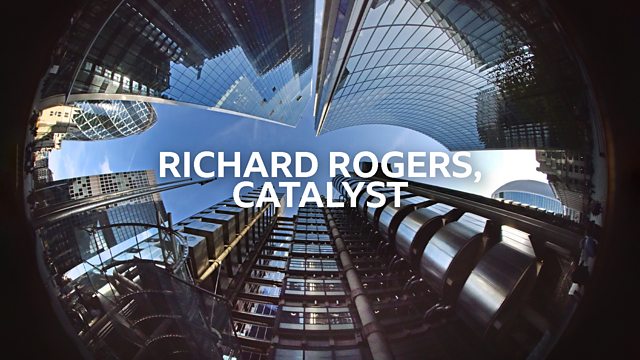Richard Rogers, Catalyst
Tom Dyckhoff looks back through the archive at the life and work of Richard Rogers, the architect who changed the face of modern Britain.
Tom Dyckhoff looks back through the archive at the life and work of Richard Rogers, the architect who changed the face of modern Britain.
When Rogers died in December 2021, he was arguably the most accomplished architect on the planet, known for designing spectacular, hi-tech buildings - flamboyant experiments like the Pompidou Centre and Lloyds of London, their guts on the outside - and municipal centrepieces like the Millennium Dome and the Senedd in Cardiff. But he also challenged and refined our ideas about public space.
It wasn't just about buildings. Throughout his career, Rogers spoke of an ethical underpinning to his work – he talked of city spaces for people and of architecture at the heart of a vibrant civil society. This became most clearly articulated when he was Chair of New Labour's Urban Task Force, which advocated a 'cities-first' policy, putting the brakes on building in the suburbs in favour of focusing construction on the centre of towns and cities.
Since the late 1970s, when the Pompidou Centre and its attendant public square was completed, British cities have changed hugely. Strange and spectacular buildings now seem to be the norm, as are mixed use, post-industrial developments. Richard Rogers was a herald of what was to come. The skateboarders clattering around Central Square in Cardiff or the families around the sandpit on the South Bank in summer might not realise it, but, in a sense, they're living in Richard Rogers' world. In some ways we all are.
Featuring: Huw Clarke, Gillian Darley, Norman Foster, Alice MacGillivray, Douglas Murphy, Anne Power and Ruth Rogers.
With grateful thanks to Joseph Henry and Victoria Lane.
For more information about Maggie's, go to: www.maggies.org
Producer: Martin Williams
Last on
Broadcasts
- Sat 17 Dec 2022 20:00±«Óãtv Radio 4
- Fri 23 Dec 2022 12:04±«Óãtv Radio 4

